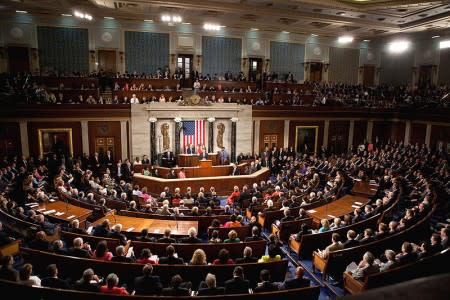A simple argument for a balanced budget amendment
When it comes to fiscal matters, the United States is in a budget dilemma that is much starker than projected a decade ago. Even in the wake of major tax cuts in 2001 and 2003, budget projections made by the Congressional Budget Office in January 2004 anticipated that revenues would equal outlays by now.
The CBO stated that the deficit for 2004 was a then-record high of $477 billion, roughly 4.2 percent of the nation’s gross domestic product. That year, like every year, the CBO also offered projections of the budget’s future. It projected that by 2013, the deficit would fall to $16 billion, or 0.1 percent of GDP, and that a surplus of 0.1 percent of GDP would occur in 2014.
What happened in reality is that the actual 2012 budget was in deficit by $1.1 trillion, or 7 percent of GDP. The 2013 CBO report shows a decrease in the deficit to $845 billion, since lowered in a mid-year update.
Although the CBO predicts slightly lower deficits in the years ahead, the 10-year baseline project is no longer headed toward balance. In fact, the United States is headed toward trillions of dollars in budget imbalance, according to baseline projections now.
Yet the “improved” news was met with some misplaced rejoicing, with claims that the problem had been overblown by “austerity scaremongers.” There is an illusion that the deficit is now under control. As our little historical review shows, the future is likely to be much worse than current forecasts.
If we are to restore economic sobriety and intergenerational fairness to the budget, a more binding solution on how Congress makes those budgets may be needed. I believe a 28th Amendment to the Constitution requiring a balanced budget is the only way to control the red ink.
While this idea may appear radical, it was initially proposed over 30 years ago, when in 1982 some version of balanced-budget legislation passed one but not both chambers of Congress.
The 28th amendment should be a constraint should be on expenditures only. Congress shall spend no more in the current year than it collected, on average, over a previous set of years. Such a constraint would limit overspending in years of rapid growth, a brake that is currently nonexistent.
Second, the amendment should be simple, focusing only on fiscal balance. My friends on the right should drop clauses with supermajorities for future tax increases. Lovely as those ideas are, they merit a separate amendment and would serve to hurt passage of this one.
Both the right and the left have to face facts: A balanced-budget amendment is currently favored by about 70 percent of Americans.
Done right, it would be favored by both Democrats and Republicans. That’s actually good news.
With the constraint in place, Congress would finally have to make real choices, prioritizing programs and forcing a balancing of what voters really want. I believe, and polls show, voters want limited government. I trust them. Do you?
Tim Kane is the Chief Economist at Hudson Institute. His forthcoming book Balance (Simon & Schuster, with Glenn Hubbard) will examine the economic decline of great powers. With Glenn Hubbard, Kane maintains a blog, www.BalanceofEconomics.com.
Recent Constitution Daily Stories
Syria situation heats up the War Powers debate
10 fascinating facts about the “I Have A Dream” speech



